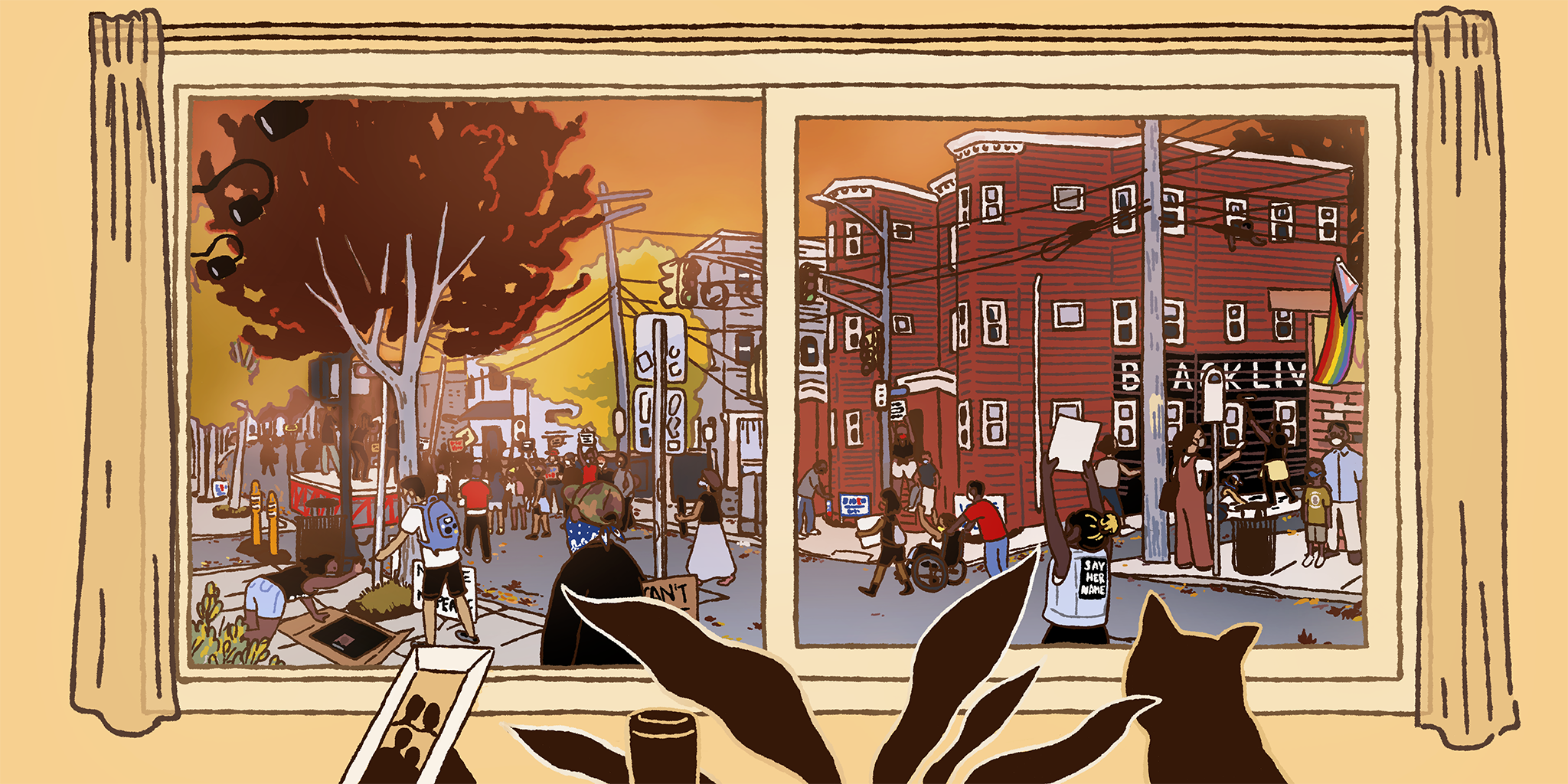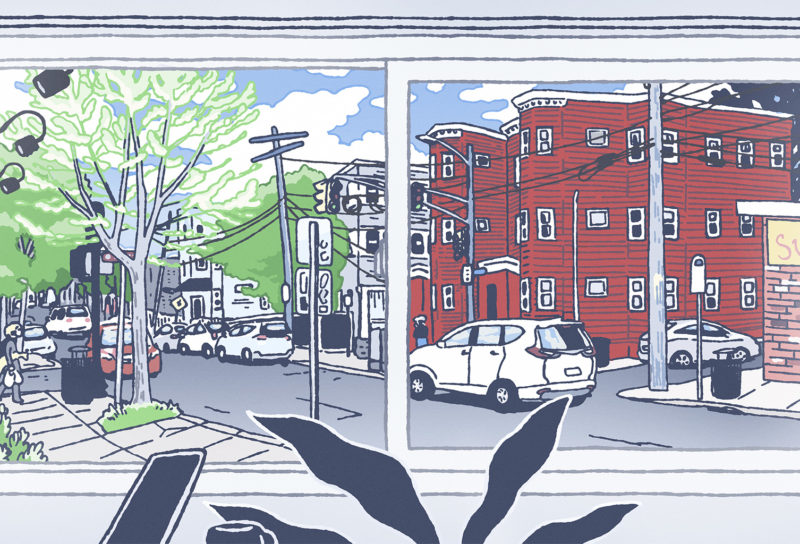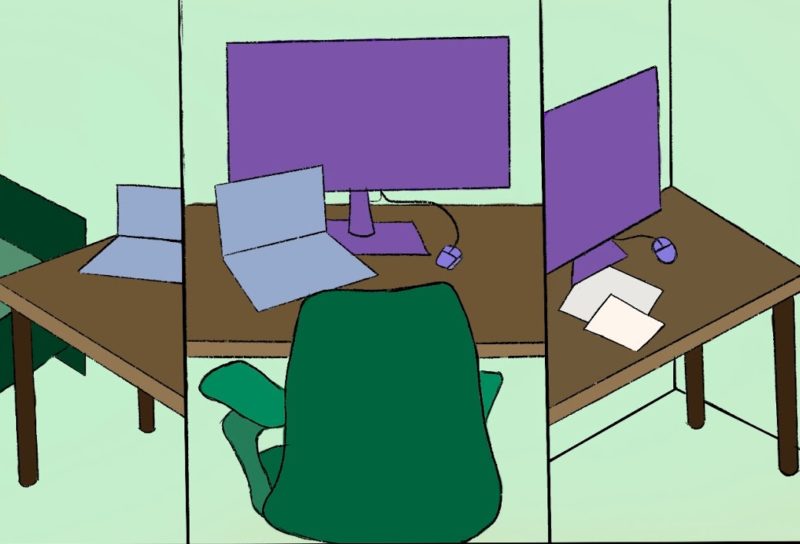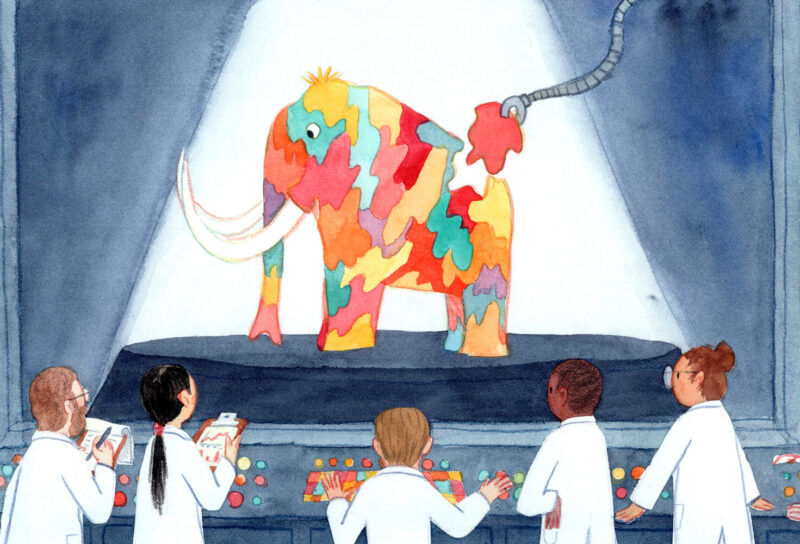For the second time this year, we’ve asked a group of scientists to keep diaries about our changing world. Last June, several members of our extended community wrote about the early chaos of COVID-19. Today, three more report back from the beginning of its second wave and the precipice of a presidential election. These are election diaries, but they won’t tell you who to vote for or make predictions about who will win. Instead, Maryam Zalinghalam, Britt Wray, and LaNell A. Williams each give you something different to think about during these maddening days. Maryam learns Persian as a way of reconnecting with her distant family and a culture that’s often vilified in this country. Britt thinks about eco-anxiety, her own and the world’s, and what COVID-19 has taught us about defending our communities against climate change. LaNell writes about how radically differently Black and white America have experienced this pandemic, and how it feels to move between those worlds. Every one of them ought to give you an idea of what’s at stake in the election next week, and what’s worth fighting for after.
My Own Private Diaspora
BY MARYAM ZARINGHALAM
Several generations of homesickness
When I was younger, my grandpa — who we called “Babash” (باباش), meaning “their dad” — would read the words of the great Persian poets like Hafez and Omar Khayyam in Persian at family gatherings. My vocabulary was too limited, too unsophisticated, to understand exactly what it all meant, but I’d cling to each word. I tried to memorize it by sound.
Babash died 10 years ago. My maternal grandmother, Assayesh (آسایش), three years ago. And my paternal grandmother, Aghdas (اقدس), last year. Each of them was a thread anchoring me to my ancestral home. With each of their passing, I feel increasingly unmoored from our culture, our traditions, and our history, ill-equipped to carry them on without the literal words to do so.
I feel those ties growing more tenuous during a time when I have never been more aware how quickly I could lose my family. And so, eight months into the pandemic, I’ve taken up Persian classes. As I learn the alphabet, I keep pestering my mom to send over some of the more basic bits of poetry to attempt to sound them out. While I’ve failed to conjure up Babash’s booming, melodic voice, I’ve finally decoded the last lines etched on his tombstone:
آمد شدن تو اندرین عالم چیست
آمد مگسی پدید و ناپیدا شد
“What of your entering and leaving this world?
A fly appeared, and was gone.”
Babash was always talking about the fleetingness of life. Maybe that’s why I was such a morbid kid. At five or six, I developed a ritual where whenever I’d flush the toilet, I’d have to spin around for as long as it flushed, reciting a prayer I made up to keep death away from my family. I eventually grew out of that habit when my parents caught me twirling by the toilet. I was too embarrassed to say, “I’m twirling so you won’t die!” But this year of pandemic, I’m struggling to keep that impulse at bay.
The Pandemic Hits Two Homes
On March 12th, I saw satellite images of mass graves being dug in Qom (قم), just 80 miles south of Iran’s capital, as the country experienced its first spike in coronavirus cases. I wept in my cubicle as I remembered my brief stop in Qom on my way to see Esfahan (اصفهان) for the first time in 2017. I’d snapped a picture of a funny truck with giant teddy bears attached to it before hopping back on the bus. I left work early that day and haven’t been back into the office since.
Less than one month later, I saw images of mass graves being dug on Hart Island, in the Bronx, just 35 miles from where my family lives. I texted the family group chat: “I love you.” My mom texted back: “What’s the occasion?!” She’s expert at diffusing my moody tendencies with a wry joke.
In all my 32 years, I’ve never gone more than a couple months without seeing my family. COVID-19 has kept me away from them for a record eight months. Iranian families are tightknit by nature and the diaspora in the wake of the 1979 Revolution has only made us tighter, carving out enclaves of our homeland here in the United States. I keep reminding myself that when my parents were my age, they were forced to go years without seeing their families. All they had were letters and the occasional phone call home.
My dad came to the United States before the Revolution to study physics through an exchange program for Iranians who showed a talent for STEM. My mom came years later, after the Revolution, for her medical residency. They met at a party among fellow Iranian ex-pats, fell in love, and started a family away from much of their own. In grad school, I fancied myself the product of science without borders. But these last four years, I’ve watched travel bans and visa restrictions passed and upheld on top of mounting sanctions. With each passing policy, I feel the increasing improbability of my parent’s story — and, in turn, the improbability of me.
I was in Tehran on January 27, 2017, when I learned of the travel ban barring entry to Iranians. I’d chosen inauguration day to travel back to see the ancestral cities of my family because I worried that soon, it’d be much harder to return.
On January 5, 2020, my partner woke up to find me sobbing. I’d just read the President had threatened to strike Iranian cultural sights. I scrolled through the photos I’d taken from my 2017 trip — me smiling in Esfahan by Si-o-se Pol (سیوسهپل), its arches lit up at night, or me sitting cross-legged holding up a pot of tea (چای) at a Kashani tea house. I remembered my grandmother showing me photos of Persepolis (پرسپولیس) a few years before she passed, her voice swelling with pride telling me of this great cultural treasure, while her eyes grew misty knowing we’d likely never see it together. I was crying those same tears.
That weekend, I took my partner to his first protest, a modest gathering outside the White House. I took a picture of a sign that read: “Give anti-imperialism a chance.” Jane Fonda spoke, connecting capitalism, climate change, and the never-ending conflict born of interventionism in the Middle East. This was the same conflict that drove my family and countless others away from their homes decades ago — the conflict that is now used to bolster policies that close off borders to us today.
Rebuilding the Language I Lost
I finally visited my parents at the end of August. The whole drive up I was preparing myself for happy tears to pour down my face as we hugged and kissed. Instead, I slipped into the house and into my usual spot on our blue suede couch, propped my feet on the coffee table and settled my head onto my mom’s shoulder as she watched TV, like no time had passed at all.
I insisted we watch home movies one night so I could show my partner footage from our trips to my favorite place in the world: my grandparent’s flower farm in Mazandaran (مازندران), along the coast of the Caspian Sea. In one of them, my aunt holds up a sugar cube and asks a four-year-old me what it is. Without blinking an eye, I shout, “قند”! She asks me what it is in English and I just smile, shake my head, and run away. I gawked at that tiny version of my fluent self, who grew into a self-fashioned science communicator who can only muster an “I’m a biologist” (من بیولوژیست هستم) to explain her work to friends and family back home.
Taking Persian classes wasn’t my idea. It was my partner’s. Being home with my family, he heard us slip between Persian and English, a sort of hybrid language he wanted to speak too. I decided to take the classes with him, partly because I couldn’t bear the thought of him having a stronger command of my language than me, but mostly because it seemed like a chance to forge a Fingilish of our own.
Hafez once wrote: “What we speak becomes the house we live in.” And so, I build.
Undeniable
BY BRITT WRAY
Eco-Anxiety in the New Age of Pandemics
You’re unlikely to ever hear climate experts say, “God I can’t wait for this year to be over,” or “When things go back to normal…” They know that the kinds of calamities this year has brought — the illness, the social cataclysm, the fires — won’t end with the coronavirus. Witnessing this preview of our looming dystopia has given me a more actionable perspective on a question I’ve been wrangling with for years: how do you get regular people to assimilate the reality of climate change into their consciousness, let alone act on it? How can we turn our pervasive eco-anxiety into productive action?
In my work, I research the psychological impacts of the climate crisis. For the past few months, at least twice a week, someone has interviewed me in order to ask some version of the same two questions: 1) ‘what can I do to cope better with eco-anxiety?’ And 2) ‘what can be done to make people care enough about the climate crisis that they become anxious in the first place?’ These people are searching for the Goldilocks zone of distress about the climate. Not too much. Not too little. Just the right amount.
My own journey with eco-anxiety started in 2017, when I woke up to the full severity of the climate and wider eco-crisis. That year, it ceased to exist solely as an intellectual problem for me, and became a massive tragedy of the heart. At the time, my partner and I were thinking about trying to get pregnant. The process of considering that decision, while reading the harrowing projections from multilateral organizations like the WHO and UN, birthed a painful dilemma. I began to seek as much information as I could about biodiversity collapse. I started bringing up climate disruption in conversations with friends, family and colleagues at every occasion, sometimes making them visibly uncomfortable. My partner even had to ask me to put a timeout on how I was talking about the climate at home, because it was affecting his mental health.
The American Psychological Association describes eco-anxiety as the “chronic fear of environmental doom,” but at its simplest, at this late stage in the climate crisis, it is merely a sign of attachment to the world. Eco-anxiety isn’t listed as a medical condition in the DSM, and many mental health professionals say it is important that it remains excluded. After all, the last thing we want is to pathologize this moral emotion, which stems from an accurate understanding of how grave of an ecological mess we’ve made. Eco-anxiety arises when we feel our vulnerability, and are in touch with our capacity to care because we are no longer numbed by our defenses. It is what happens when we bring our thinking and feeling together. When the issue is only contained in the mind, and not in the stomach or heart, our brains (which are adapted to protect us from discomfort) split the full extent of our reality off with an impressive cadre of unconscious tricks. They’re meant to be features, but in this civilization-threatening scenario, they’re just bugs.
This problem would be easier to manage if we were neatly divided between climate realists and climate deniers. In fact, most of us, whether we admit it or not, are stuck somewhere in between. The most prevalent defense against climate breakdown is what psychoanalysts call disavowal. Disavowal is like having one eye open and one eye closed to the truth at the same time. It happens when we believe the science, understand the risks, and are concerned about systems collapse, but still find ways to play down the threats, so that we can continue to live our lives according to our desires, and hop on the next plane. We read that we are fast approaching tipping points, which, once surpassed, will set off a cascade of impacts across biophysical systems that cannot be reversed. But knowing something intellectually and fully comprehending it are not the same thing. And so we kick the can down the road, avoiding uncomfortable changes. Sound familiar?
The coronavirus, the rise of authoritarianism, and the looming ecological collapse, all mess with our sense of ontological security, the feeling of continuity in the order of our lives. For sociologist Anthony Giddens, ontological insecurity concerns a “person’s fundamental sense of safety in the world and includes a basic trust of other people.” Indeed, my eco-anxiety became significant not only because the climate is clearly breaking down, but because I lost trust in other people’s abilities and determination to solve the problem. Our leaders have been either fully denying the crisis, or promising paltry action that will only delay the inevitable, rather than addressing this emergency at the scale that it demands.
All this anxiety comes from a shared source: the planetary health crisis, which encapsulates climate change, species extinctions, water scarcity, food insecurity, air pollution, and land transformation. The pandemic is not separate from, but a symptom of our planetary health crisis. As we continue sucking resources out of the natural world — by cutting trees in tropical forests for example, or extracting mineral and fossil fuels — we also suck viruses out of species that live in the wild places we tear into, and draw them into us. Epidemiological research shows we can only prevent future spillovers and stop outbreaks from turning into pandemics if we develop the political willpower to change the way we interact with the natural word. Scientists have proposed that the next spillover is likely to come from the Amazon, as we continue to clear its trees and force species to interact with invading humans.
All this ought to compel us to rethink our relationship to nature itself, replacing our default mode of domination with a model of mutually beneficial partnership. This means getting rid of growth-based capitalism. Otherwise, there will just be more pandemics, not to mention waves of genocidal-level deaths as places become uninhabitable.
Complexity scientists, who study the interactions between complex systems like the climate system and the political system, saw the growing cracks in our democracies coming. They know that, as humanity dances on an ever-sharpening knife’s edge, the loss of ontological security we feel — and the anxiety it stirs up — will make many voters seek simple solutions to increasingly complex problems. Populist leaders, who have uncomplicated explanations for domestic and international turmoil, such as “it’s the immigrants’ fault,” benefit from our turmoil. Strongmen for strange times.
On a society-wide level, we have failed to connect COVID-19 to climate change as signatures of the exact same problem, which prevents us from a necessary act: addressing them simultaneously. If there’s one thing the pandemic has taught us about climate response, it seems to be that we’ll only take the climate threat seriously when it starts killing the people we love. Even then we still won’t all agree about the legitimacy of the threat, and we’ll be ready to sacrifice a lot: elderly and poor people all around the world, the climate equivalent of people who can’t afford to work from home. Our leaders will say we’re all in this together, when they know that’s really a lie.
So in this election season, while there’s no question of the outcome I want, my main concern is about the lack of systems thinking on behalf of even our preferred leaders. This is no longer a cute gripe about short-term thinking in politics; we’re running out of time. Sure, 2020 has been a terrible year, but it is nothing compared to what could be coming. We require some honesty about that fact from our leadership, and for them to feel the kind of anguish that can break through their own walls of defenses. Only then, will we find the wellspring of energy we need to act together and in time.
No matter who wins the presidential election, citizens all over the world are going to have to rise up to become the prosocial tipping points in order to safeguard a liveable climate for ourselves. We have to put up the fight of our lives for the sake of our survival. There is no doubt that one election outcome will make this fight far easier than the other, but either could breed complacency. Pushing back against that is my way, as a Canadian living in the US, of fending off my sense of powerlessness. Rather than sit around with my thoughts, these days, I’ve found that resolve for me means accepting that Goldilocks is gone, and finding the will to do the right thing for the present moment, without attachment to outcome. It’s the best way I’ve found to feel empowered in our predicament, and at peace with the ballot I won’t be able to cast, as I wait for the American people to have their say on all of our futures.
A Tale of Two Pandemics
BY LANELL A. WILLIAMS
The Twin Paradox of COVID-19
In one of my undergraduate physics courses, I learned about the Twin Paradox. It’s a thought experiment in special relativity where you split up two identical twins and send one to space while the other stays here. Eventually, when the two are reunited, it turns out that the twin that stayed on Earth is drastically older than the one that was sent to space. Why is that? Shouldn’t the same amount of time have passed? In physics, we understand this to be due to what we call time dilation, which describes the inequity in “time” that each twin experiences within their respective reference frames. We can rectify the twin’s age difference by using a concept called length contraction, which allows us to account for the difference in “time” that each twin experiences. This allows the twins to agree on the passage of time and believe the other’s reality.
Unfortunately, reconciling the drastically different lived experiences in our country is a much taller task than anything discussed by special relativity — particularly during the biggest public health crisis in a hundred years. As a Harvard University PhD student, I have been allowed the opportunity to experience the pandemic from two drastically different reference frames. It has allowed me to witness my white upper class colleagues sitting in the comfort of their well-spaced homes and optional vacation houses to wait out the pandemic, every once in a while taking advantage of cheap plane tickets to go on much-needed vacations.
The other reference frame comes from my experiences as a Black woman from an underserved community in Memphis, TN. My friends and family there have had a very different experience of the pandemic. Over the summer, I mourned month after month as I watched the statistics about the contraction and death rates in minority communities manifest in our lived reality. I mourned with my friends and family as we watched our loved ones get sick and pass from COVID-19. I mourned for the people who experienced the most severe symptoms and could not get proper care because they lacked health insurance. I mourned with my community as we witnessed the many deaths of unarmed Black folks like Breonna Taylor and George Floyd that presented a constant reminder of our struggle with anti-Black racism and police brutality.
Soon that mourning turned into frustration and anger because I felt trapped. Pre-existing circumstances didn’t allow me to move as freely through the world as my colleagues. It didn’t allow my loved ones who lived in densely populated areas the privilege to socially distance and keep themselves safe. It didn’t allow me to indulge my institution’s attempts to make us feel “normal” while the world was falling apart. But I still felt compelled to smile in front of my colleagues each and every week.
For much of the summer, it felt like I was surrounded by death. And despite how much I wanted to inform my colleagues of how I felt, I knew that there was no way they could truly understand. To begin to explain felt exhausting. I wanted to reach out to others because that is how we learned to cope, but it’s really difficult to do so as a Black female scientist in an environment that constantly patronizes you.
I felt stuck — I still feel stuck — at the interface of this blissful sanctuary provided by Harvard and the ongoing tragedy that I saw back home. I felt tortured as I watched our systematic and historical inequities produce two dramatically different experiences, almost as remote from each other as the twins in the paradox. Unfortunately, there is no relativistic equation or theorem that will suddenly balance the inequities created from hundreds of years of patriarchy, colonialism and white supremacy.
The “fortunate” part about this pandemic is that white America has been forced to engage with these issues, whether consciously or subconsciously. COVID-19 didn’t “expose” these inequities. There was just no way of ignoring them anymore.
It scares me to think that it took a tragedy of this magnitude for our country to pay a bit more attention to what Black America has been saying all along. Anti-Black racism isn’t new. The racial wealth and education gap isn’t new. Police brutality isn’t new. And, if they’re new to you, you probably weren’t paying enough attention.



